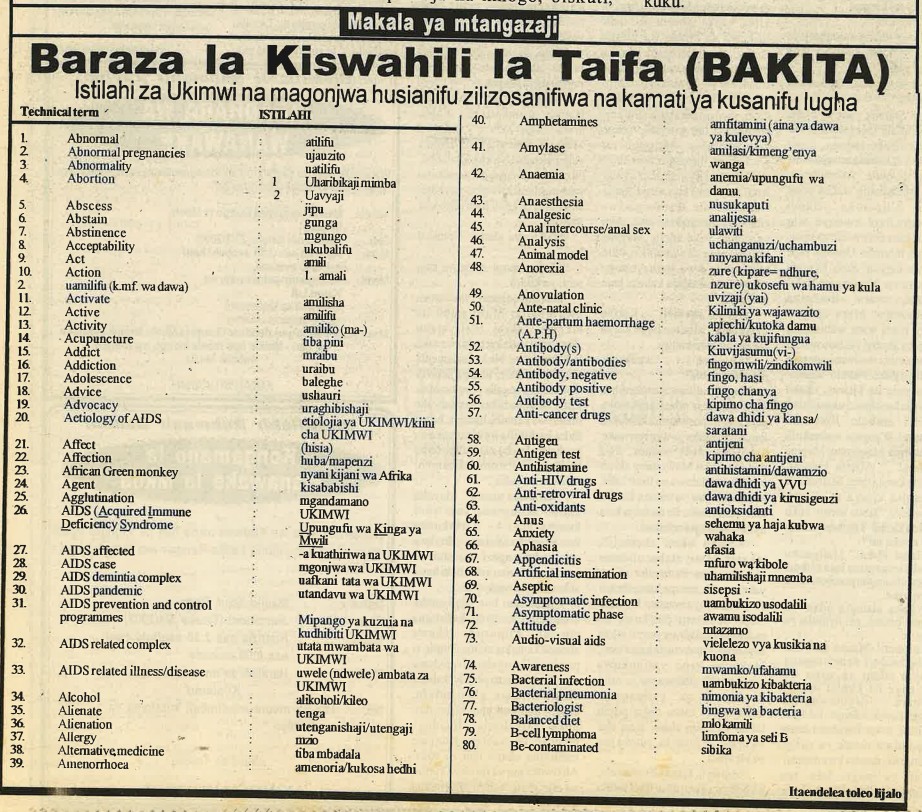World Kiswahili Language Day
 On 7 July, we celebrate World Kiswahili Language Day. Swahili is one of the most widely spoken languages of the African linguistic family and the most commonly used language in sub-Saharan Africa. It ranks among the top-ten most spoken languages in the world, with over 200 million speakers. Swahili serves as a lingua franca in many countries across East, Central, and Southern Africa, as well as parts of the Middle East.
On 7 July, we celebrate World Kiswahili Language Day. Swahili is one of the most widely spoken languages of the African linguistic family and the most commonly used language in sub-Saharan Africa. It ranks among the top-ten most spoken languages in the world, with over 200 million speakers. Swahili serves as a lingua franca in many countries across East, Central, and Southern Africa, as well as parts of the Middle East.
The date was chosen to commemorate the decision of Julius Kambarage Nyerere, then leader of the Tanganyika African National Union (TANU) and future first president of Tanzania, to adopt Swahili as a unifying language in the struggle for African independence. Jomo Kenyatta, the first president of Kenya, followed this example by using Swahili to rally and unify the people of Kenya in their fight against colonialism, notably through the popular slogan Harambee, meaning "all pull together".
In Tanzania the day is probably the most actively celebrated with a complete week marked by all kind of sports events, cultural, social and other community activities. At the university campus several publishers and book-related organisations display their products and services in front of the library. On the day itself, several officials including the head of state deliver speeches. Furthermore, there is an award ceremony for winners of the annual national Swahili essay amongst other activities.
In neighbouring countries, the day is certainly not so emphasized as it is in Tanzania. While Kenya usually devotes 2 to 3 days to the national language, Rwanda only marks the day in short articles or references in the newspapers. (see for example the Rwandese New Times 10 July 2023, p. 2 "Seven facts about Kiswahili"). In Uganda, the case is even more complicated: even though Swahili is an official language and the need for more African unity is felt, it is not very popular because it is associated with the brutal regime of Idi Amin and the army (see for example Edna Namara, Why it has taken Uganda so long to embrace Kiswahili).

The National Swahili Council BAKITA is the organization officially in charge of defining new words and terminology. Long lists classified by theme were published in all newspapers. These words did not always take root. In the early 1980s the Swahili equivalent for the acronym “AIDS” was Mahabusi, more or less a literal translation: MAtokeo ya HAli ya BUrungiko la SlIaha za mwili. An additional advantage was the polyvalence of the word: it also means ‘prisoner’. Later, probably influenced by the Kenian journalist Edward Kadilo, another acronym appeared: UKIMWI. Currently, most Swahili speakers only know this word as the word for HIV/AIDS.
In the current ASCL collection plan the library announced a historical shift. For the first time in our history, it included publications written in Swahili. With just over 2000 titles, the collection is small but growing and features predominantly literary fiction. In earlier webdossiers and highlights, such as Tanzanian children's and youth literature and East African literatures, parts of our Swahili collection are highlighted.
Traditionally our collections are mostly in print, but it is clear that in the rapidly evolving (self) publishing industry these Swahili print books are often the last stage of a much longer process, in which different editions of the work appear. So it is possible that the World Kiswahili Day 2026 will not only feature print Swahili books but also ‘nakala laini’ (soft copies) or ‘improved’ editions by AI.
Selected publications
Gurnah, Abdulrazak, Peponi (Tanzania, 2022).
Haji, Haji Gora, Shuwari (Paris, 2019).
Mauya, Athumani B, Harusi ya Dogoli (Dar es Salaam, 2016).
Mtobwa, Ben R, Kiguu na njia (Dar es Salaam, 2023).
Mutembei, Aldin Kaizilege, Korasi katika fasihi: nadharia mpya ya uhakiki (Dar es Salaam, 2012).
Omari, Shani en Adventina Buberwa ed., Kiswahili katika nyanja za kimataifa (Dar es Salaam, 2023).
Shariff, Ibrahim Noor, Tungo Zetu: Msingi wa Mashairi na Tungo Nyinginezo (London, 2022).

